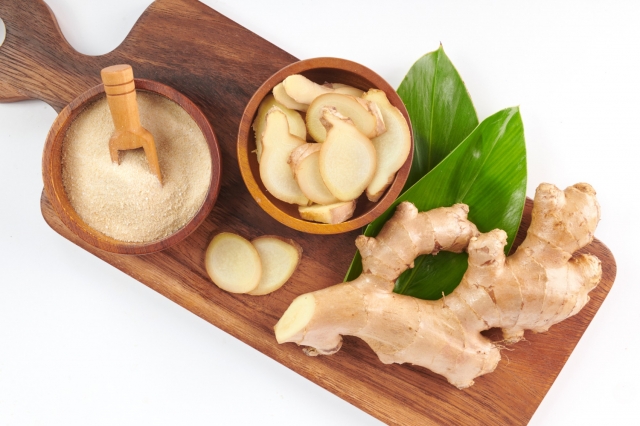Ginger, a potent root with a rich history in traditional medicine, has recently garnered widespread attention for its incredible health benefits. From reducing inflammation to boosting immunity, this humble Herbs for Heart Health that can transform your well-being. In this blog post, we explore how ginger supports various aspects of health, its proven benefits, common uses, and scientific evidence that backs up its powerful effects.
What Is Ginger?
Ginger (Zingiber officinale) is a flowering plant native to Southeast Asia, prized for its rhizome (root), which is used as both a spice and a medicinal herb. Its distinct, spicy flavor makes it a popular addition to cooking, teas, and even supplements.
Not only is ginger a flavorful kitchen staple, but it also holds a revered place in alternative medicine for its natural healing properties. Historically, ginger has been used to treat ailments such as nausea, indigestion, and even pain.
Health Benefits of Ginger: A Natural Powerhouse
1. Reduces Inflammation and Relieves Pain
One of the most well-documented benefits of ginger is its ability to combat inflammation and reduce pain. Studies show that ginger contains bioactive compounds like gingerol that act as potent anti-inflammatory agents. By inhibiting certain enzymes in the body, ginger helps reduce inflammation, which can alleviate symptoms of conditions like arthritis, muscle pain, and joint pain.
-
Scientific Proof: A 2015 study published in the Journal of Pain found that consuming ginger helped reduce pain and stiffness in people with osteoarthritis.
-
Application: Incorporating ginger into your daily diet can help reduce chronic inflammation, potentially decreasing the need for over-the-counter painkillers.
2. Supports Digestive Health
Ginger has long been regarded as an effective remedy for digestive issues. It promotes healthy digestion by stimulating the production of digestive enzymes, helping to break down food more efficiently. Ginger is also known for its ability to alleviate nausea and bloating.
-
Scientific Proof: Research from the National Institutes of Health (NIH) indicates that ginger is particularly effective in treating nausea caused by motion sickness, pregnancy (morning sickness), and chemotherapy.
-
Application: Sipping on ginger tea after meals or adding fresh ginger to your food can help prevent digestive discomfort, bloating, and nausea.
3. Boosts Immune System Function
Ginger is packed with antioxidants and nutrients that support a healthy immune system. It contains compounds that help fight off infections, reduce oxidative stress, and promote better overall health. Ginger's antiviral and antibacterial properties make it an excellent natural defense against colds and flu.
-
Scientific Proof: A study published in the Journal of Immunology Research showed that ginger enhances immune function by increasing the activity of certain immune cells.
-
Application: Drink ginger tea or add it to smoothies to enhance your immune system, particularly during cold and flu season.
4. Promotes Healthy Blood Sugar Levels
Maintaining healthy blood sugar levels is crucial for overall health, and ginger has been shown to play a role in regulating blood glucose. The root helps improve insulin sensitivity, which is vital for those managing diabetes or those looking to prevent the condition.
-
Scientific Proof: A study published in the Journal of Complementary and Integrative Medicine in 2015 found that ginger supplementation significantly lowered blood sugar levels in individuals with type 2 diabetes.
-
Application: Consuming ginger daily, whether in food or as a supplement, may assist in managing blood sugar and improving insulin function.
5. Aids in Weight Loss
Ginger's thermogenic properties may also support weight loss by increasing calorie burning and fat breakdown. Studies suggest that ginger helps regulate fat metabolism, reduce appetite, and promote fat burning.
-
Scientific Proof: A 2012 study in the Metabolism Journal found that ginger supplementation contributed to a reduction in body fat and waist circumference.
-
Application: Regularly adding ginger to your diet—whether in smoothies, teas, or meals—could support a healthy metabolism and weight management.
6. Improves Cardiovascular Health
Ginger may also have beneficial effects on heart health. It has been shown to reduce cholesterol levels, lower blood pressure, and improve circulation—all factors that contribute to a healthy heart. By lowering levels of LDL cholesterol (the “bad” cholesterol), ginger can help prevent heart disease.
-
Scientific Proof: Research published in the Journal of Nutrition highlighted that ginger supplementation resulted in significant reductions in blood pressure and cholesterol levels.
-
Application: Including ginger in your diet, particularly in the form of fresh ginger tea, can promote healthy blood pressure and cholesterol levels.
Common Ways to Use Ginger for Health
1. Ginger Tea
One of the easiest and most effective ways to consume ginger is through tea. Simply steep fresh ginger slices in hot water and add a bit of honey or lemon to taste. Ginger tea is soothing, anti-inflammatory, and helps with digestion.
2. Fresh Ginger in Cooking
You can add fresh ginger to a wide variety of dishes, from stir-fries to smoothies. Ginger adds a spicy kick to savory and sweet recipes alike, including curries, soups, and baked goods. Its versatility makes it easy to incorporate into your daily meals.
3. Ginger Supplements
For those who may not enjoy the taste of ginger, supplements are a great alternative.
6or extracts provide a concentrated dose of ginger's active compounds. However, it's always best to consult with a healthcare provider before starting any supplementation.
4. Ginger Oil
Ginger essential oil has anti-inflammatory properties and can be used in aromatherapy or diluted with a carrier oil for topical application. It can help relieve muscle aches, reduce nausea, and improve circulation when massaged into the skin.
Scientific Studies Backing Ginger's Health Benefits
-
Anti-inflammatory Properties: A 2014 study in the Journal of Medicinal Food concluded that ginger's anti-inflammatory effects could help treat conditions like arthritis, rheumatoid arthritis, and osteoarthritis.
-
Digestive Health: The Journal of Gastroenterology published a study that demonstrated ginger's effectiveness in improving gastric emptying and treating symptoms of indigestion.
-
Immune System Support: Research in the British Journal of Nutrition confirmed that ginger improves immune function and reduces the risk of infections.
Conclusion: Ginger as a Natural Health Powerhouse
Ginger is much more than a kitchen spice—it's a powerful herb with a wide range of health benefits. From its ability to reduce inflammation and improve digestion to boosting immunity and supporting heart health, ginger can play a key role in transforming your overall well-being. Backed by scientific studies and centuries of traditional use, ginger is a natural remedy that deserves a place in your daily routine.
Incorporating ginger into your diet is easy and delicious, whether through fresh ginger in meals, soothing ginger tea, or supplements. Always consult with a healthcare provider if you plan to use ginger for medical purposes, particularly if you have existing health conditions.






